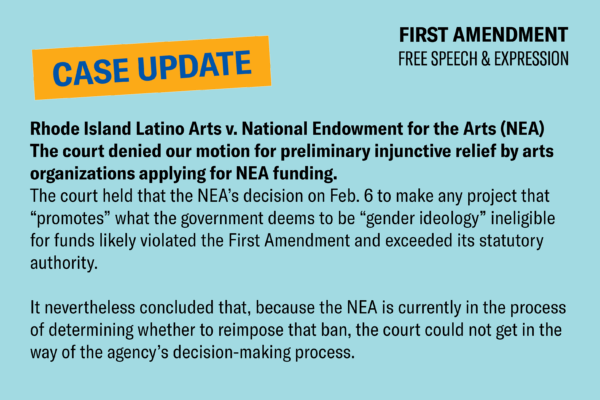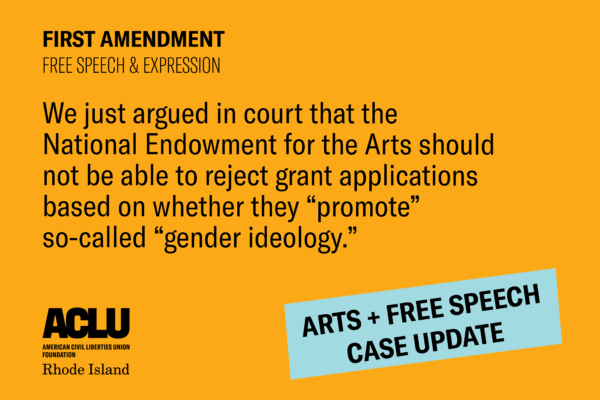In an important victory for First Amendment rights, a federal judge in Rhode Island has ruled in favor of four arts organizations in their challenge to the National Endowment for the Arts’ (NEA) policy disfavoring any grant applications for projects that the government believes “promote gender ideology.” The court held that the NEA’s policy violates the First Amendment and the Administrative Procedure Act (APA), and enjoined and set aside its implementation of an executive order that prohibits federal funding for grants that express ideas disfavored by the government.
U.S. Senior District Court Judge William Smith held that the NEA’s grant application review process “violates the First Amendment because it is a viewpoint-based restriction on private speech.” The order explains, “the NEA intends to disfavor applications that promote gender ideology precisely because they promote gender ideology. The Final Notice therefore promises to penalize artists based on their speech.”
Additionally, the court determined the NEA’s policy was “arbitrary and capricious” in violation of the APA because
“…there is zero explanation of what it means for a project to ‘promote gender ideology,’ let alone how that concept relates to artistic merit, artistic excellence, general standards of decency, or respect for the diverse beliefs and values of the American public.”
The suit was filed in March by the ACLU and the ACLU of Rhode Island on behalf of Rhode Island Latino Arts (RILA), National Queer Theater (NQT), The Theater Offensive (TTO), and Theatre Communications Group (TCG) after the NEA began requiring applicants to attest that they would not promote so-called “gender ideology” in order to be eligible for funding, and would bar any projects that were deemed to do so from getting an award. In immediate response to the ACLU’s litigation, the NEA paused the “gender ideology” certification requirement and undertook another decisionmaking process on how to implement the executive order banning the use of federal funds to “promote gender ideology.”
In April, the court held that the NEA’s decision to make any project that promotes “gender ideology” ineligible for funds likely violated the First Amendment and exceeded its statutory authority, but held off issuing an injunction in order to give the agency time to decide whether and how it would implement the executive order.
In late June, the ACLU filed a motion once again asking the court to issue an injunction after the NEA admitted that it would disfavor projects based on whether they “promote” what the government deemed to be “gender ideology.”
The court case was filed by the American Civil Liberties Union; the ACLU of Rhode Island through cooperating attorney Lynette Labinger; and David Cole, in the U.S. District Court of Rhode Island.
The court ruling can be viewed here. All case documents can be viewed here.
“Rhode Island Latino Arts is proud to have received a favorable ruling in our legal challenge against the federal government regarding restrictions tied to funding and the expression of identity through the arts,” said Marta v. Martínez, the Executive Director of Rhode Island Latino Arts. “This decision affirms what we have always believed: the freedom to create, to express one’s truth, and to tell our stories is a right protected by the First Amendment. As an organization deeply rooted in storytelling, theater, and the preservation of cultural history, we are relieved and grateful that the courts have recognized the importance of protecting artistic expression for all people, including those in LGBTQ+ communities.”
"This is an important victory for freedom of speech and artistic freedom," said Vera Eidelman, senior staff attorney with the ACLU's Speech, Privacy & Technology Project. "At a time where the government is using its full weight to try to impose ideological conformity, this order is an important reminder that the First Amendment protects us from exactly that. Even when the government funds private speech, it does not get to support only those messages that parrot its views."
“The First Amendment doesn’t allow the federal government to restrict speech based on what the current administration may or may not like. Congress specifically set up the National Endowment for the Arts to insulate it from this type of political meddling in funding the arts,” said Steven Brown, executive director of the ACLU of Rhode Island. “This ruling is a win for our plaintiffs, and for free speech.”



